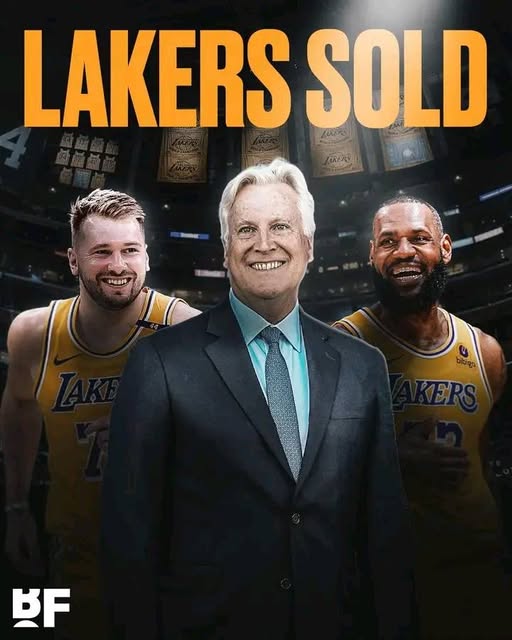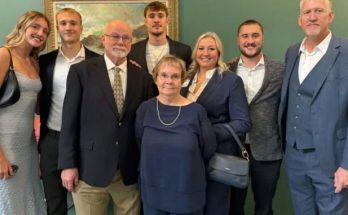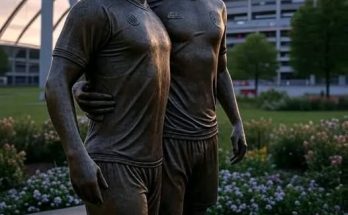It’s official: After decades of stewardship that shaped the very identity of one of the most iconic franchises in all of sports, the Buss family has entered an agreement to sell majority ownership of the Los Angeles Lakers. The new majority owner? None other than Mark Walter, co-owner of the Los Angeles Dodgers and one of the most influential figures in American sports ownership. The agreement, confirmed by both parties early Thursday morning, marks a seismic shift in the NBA landscape and brings a new era of leadership to the Purple and Gold.
This landmark transaction effectively ends the Buss family’s reign that began in 1979, when Dr. Jerry Buss purchased the team and helped transform it into a global sports empire. Under his guidance, the Lakers became synonymous with “Showtime,” glamour, championships, and some of the greatest players the NBA has ever seen—Magic Johnson, Kareem Abdul-Jabbar, Kobe Bryant, Shaquille O’Neal, and LeBron James, to name a few.
In recent years, the ownership mantle was carried by his daughter Jeanie Buss, who has served as the team’s controlling owner and president since 2013. Through turbulent times, roster shakeups, and a 2020 NBA Championship won in the Orlando bubble, Jeanie remained a fiercely loyal and passionate steward of her father’s legacy. But sources close to the matter suggest that increasing financial pressures, internal disagreements among family shareholders, and a vision for long-term franchise modernization led to the decision to sell.
Enter Mark Walter, a name already etched into Los Angeles sports lore. As the principal owner and chairman of the Dodgers, Walter played a key role in reviving the historic baseball franchise and transforming it into a perennial contender. Under his leadership, the Dodgers won their first World Series in over three decades and have consistently maintained one of the highest payrolls and deepest farm systems in Major League Baseball.
Walter is also the CEO of Guggenheim Partners, a global investment firm with assets totaling more than \$300 billion. He’s no stranger to the business of sports and entertainment. Along with Magic Johnson and other investors, Walter was instrumental in the 2012 purchase of the Dodgers for \$2.15 billion—a then-record sum for a professional sports franchise. Now, by adding the Lakers to his sports empire, Walter firmly plants himself at the epicenter of Los Angeles sports, overseeing two of the most storied teams in American history.
Though the financial terms of the Lakers deal have not been disclosed, early estimates peg the valuation north of \$8 billion, making it one of the largest franchise sales in sports history. The NBA Board of Governors must still approve the transaction, but sources indicate that no substantial roadblocks are expected.
Reaction across the league has been swift and emotional. “This is the end of an era,” said Magic Johnson, the Lakers legend and longtime Buss family confidant. “Dr. Buss changed my life. Jeanie has carried the torch with love and integrity. I know this wasn’t an easy decision, but I trust that Mark Walter will respect the legacy and push the Lakers forward.”
Fans have taken to social media to express a mix of gratitude, anxiety, and cautious optimism. For many, the Lakers are more than just a basketball team—they are a family institution, tightly woven into the cultural fabric of Los Angeles. Dr. Buss wasn’t just an owner; he was a visionary who revolutionized the business of sports with his pioneering mix of entertainment, excellence, and celebrity synergy. To think of the Lakers without the Buss name attached is, for some, akin to breaking up the Beatles.
Yet others see opportunity. Mark Walter brings financial muscle and a track record of organizational efficiency. His Dodgers have become a model franchise, blending analytics with tradition, star power with depth. The hope among Lakers faithful is that he will apply that same balance to a team still navigating the final chapters of LeBron James’s career while preparing for a post-superstar future.
Jeanie Buss released a heartfelt statement shortly after the announcement: “The Lakers have been the pride and joy of our family for over four decades. We are immensely proud of what we’ve accomplished and eternally grateful to the fans who have been with us through every up and down. This decision did not come lightly. We believe that Mark Walter is the right person to guide the Lakers into their next great chapter. His commitment to Los Angeles, to sports excellence, and to innovation is clear. I will remain connected to the organization and continue to support its success in every way possible.”
While Jeanie’s statement hints at a continued presence within the organization—possibly as a minority owner or honorary figurehead—it is clear that operational control will shift to Walter and his management team. That could mean a new front office structure, a refreshed basketball operations philosophy, and perhaps a more aggressive push toward financial expansion, including upgrades to Crypto.com Arena, increased international branding, and digital content ventures.
Walter, for his part, struck a tone of reverence and resolve in his initial comments: “I have deep respect for the legacy the Buss family built with the Lakers. They have set the gold standard in professional sports. I am honored to carry that legacy forward, and I am committed to bringing championship basketball back to Los Angeles on a consistent basis. The Lakers are more than just a team—they’re a symbol of excellence and aspiration.”
NBA Commissioner Adam Silver issued a statement praising both parties and offering support for the transition: “The Buss family has been foundational to the success of the NBA for over 40 years. Their passion, leadership, and innovation helped build the league into what it is today. We welcome Mark Walter’s continued involvement in our league and look forward to seeing the Lakers continue their tradition of greatness under his stewardship.”
This moment of transition arrives during a crucial time for the Lakers. The franchise is at a competitive crossroads, trying to balance a win-now mentality with the inevitable need to rebuild for the future. LeBron James remains a generational talent but is nearing the twilight of his career. Anthony Davis, while elite, has faced health issues and mixed results as a solo leader. The roster around them has been in flux for several seasons, and there is growing pressure to identify a long-term vision.
With Walter at the helm, there could be renewed investment in scouting, player development, and cap flexibility. His business acumen might also lead to strategic moves off the court, including expanded global partnerships, enhanced fan engagement through tech-driven initiatives, and perhaps even a streaming or docuseries push to rival what he has already done in baseball.
Speculation is already swirling about possible front-office changes. General Manager Rob Pelinka, long backed by Jeanie Buss and Kobe Bryant before her, could be evaluated under a new ownership microscope. Likewise, Head Coach Darvin Ham’s future may hinge on how the team performs in the upcoming season. Stability has been fleeting in recent years, and with a new boss in town, no one’s job is guaranteed.
But amid all the analysis and projections, one thing remains certain: this is a watershed moment in NBA history. The Buss family’s era, marked by loyalty, family unity, and a deeply personal investment in the team’s soul, has given way to a new era driven by big-market ambition, deep pockets, and the kind of institutional savvy that only a few can claim. In passing the torch to Mark Walter, the Lakers step into a future brimming with promise but tinged with nostalgia.
For a franchise that has always embraced drama, spectacle, and transformation, this chapter might be its boldest yet. Whether Walter’s ownership ushers in another dynasty or merely a new identity, the lights in Los Angeles are once again burning bright with the possibility of greatness. The curtain may be closing on one family’s extraordinary run, but the show, as always in Hollywood, is far from over.



